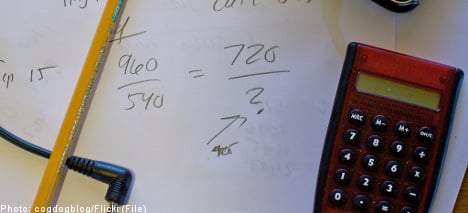On Wednesday, Unicef released the results of its examination into the state of children’s well-being across the “rich” world, titled Report Card 11.
While Sweden performed well overall, when it came to educational achievement by the age of 15, the Nordic nation posted its worst results of all areas measured in the study.
Unicef looked at students’ knowledge in reading, maths, and science literacy, and concluded that Swedish teens ranked 18th out of the 29 countries included in the report, far behind its Noric neighbours.
Finland claimed the top spot, with Canada and the Netherlands rounding out the top three. The UK placed 11th, sandwiched between Norway and Denmark. The United States, meanwhile, placed 16th.
“Sweden’s education results are way too low. They’ve been sinking almost uninterrupted for the past 25 years,” Education Minister Jan Björklund told the TT news agency.
“That’s why we’re introducing a number of reforms to Swedish schools’ policy.”
He added that teachers in Sweden have complained about the number of reforms undertaken in recent years.
“But the reason is that we have to break this trend,” said Björklund.
However, the results are nothing new, according to Sverker Härd, department head at the Swedish National Agency for Education (Skolverket).
“We are not surprised,” he told The Local.
“This isn’t news to us, this report is based on studies that we ourselves have conducted and presented. These kinds of reports are good, they often lead to great political initiatives.”
He added that Sweden’s style of teaching has changed over the past few years, with the individual student taking more responsibility for their own learning as teachers take a step back.
“Sweden is not alone in having declining knowledge results among students, however, our situation is unique in the sense that we have both a negative average and an increasing gap between the best and worst knowledge results,” Härd said.
Sweden wasn’t the only wealthy country to find itself in the bottom half of the list, with Austria placing 22nd and Luxembourg 26th.
“When Swedish children themselves were asked how satisfied they were with their lives, Sweden didn’t finish so well either – finishing 11th place,” Unicef Sweden wrote in a statement.
“Sweden also has the highest figure in Scandinavia – 5.5 percent – when it comes to the number of youths who neither work, perform internships, or study.”
Sweden, however, finished well on average in the report, reaching the top five overall behind Netherlands, Norway, Iceland, and Finland.
Back in 2000, Sweden finished first in the study.
Sweden performed best overall in Health and Safety, ranking second worldwide and boasting low rates of infant and youth mortality rate.
TT/The Local/og/sh



 Please whitelist us to continue reading.
Please whitelist us to continue reading.
Member comments